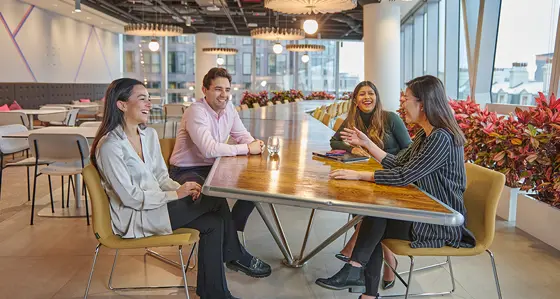
DEI fatigue: what is it and how can we address it?
13 May 2025
In today’s diverse and rapidly changing world, the need for inclusive workplaces remains stronger than ever, yet diversity, equity and inclusion (DEI) fatigue poses a challenge in maintaining sustained efforts towards meaningful change.
The term ‘DEI fatigue’ isn’t new. First used in the 1990s, the term became mainstream in 2020 following the Black Lives Matter Movement and can be described as the stress associated with attempting to diversify a workforce through recruiting and hiring. It includes feelings of frustration or exhaustion associated with creating, and sustaining, a diverse and inclusive workplace.
Why are we talking about this now?
In the wake of the COVID-19 pandemic and widespread protests following the murder of George Floyd, many organisations added diversity, equity and inclusion as a strategic priority.
Corporate commitments were focused on embedding DEI as an essential for doing good business, with equity-focused leadership, company-wide allyship training and target-led recruitment being a few of the many initiatives headlining multi-year DEI strategies. The large push for DEI across organisations and a societal shift in expectations for individuals, has led to an increase in DEI fatigue in these organisations. Moreover, while these efforts led to significant interest and shifts in understanding of the deep-rooted challenges that exist, the turn of 2025 has seen many organisations pausing to reflect and reassess.
At Baringa, we pride ourselves on DEI being at the heart of everything we do but we are not immune to DEI fatigue. In March 2025, the Ethnic Diversity Network hosted an engaging roundtable discussion bringing together DEI Champions across government, financial services, academia, recruitment and e-commerce to discuss how DEI fatigue is manifesting and the skills needed to continue driving sustainable progress in an everchanging environment. Here are our three key takeaways:
1. DEI is a journey worth continuing
To deliver sustainable DEI strategies, DEI should be considered as an organisational change programme. In this sense, a strong business case is required and it should continue to evolve over time as organisations mature.
To quote Marshall Goldsmith: “what got you here won’t get you there”, and so we should be regularly reviewing our business cases, priorities and key initiatives to account for the experiences gained and lessons learned. This will help ensure that our programmes remain in tune with the needs of our organisations and deliver the desired effect.
Despite the emerging deceleration and fatigue, organisations are seeing pockets of progress and where support remains, organisations remain understanding of the need to continue the journey. Reframing the journey and fostering a culture of shared responsibility can help to reenergise agendas and prevent unintended consequences, such as DEI backlash, in the months and years ahead.
2. The delayed effect
It is also important to recognise that there is often a lag between action and outcome. DEI efforts are ongoing and require significant commitment of time, energy and emotional capacity.
Many of the initiatives in recent years may have focused on quick wins like celebratory events, promotional campaigns and mandatory unconscious bias training, to name a few. These initiatives have been key in demonstrating commitment and building momentum, however, some organisations are now observing diminishing returns as the pace of progress slows.
Where organisations are maturing in their agendas or progressing to longer term initiatives, the results are slower to materialise. This may increase the feeling of fatigue for DEI Champions who are unable to demonstrate results quickly enough, or for allies who support and advocate but may feel overloaded with responsibility or lack of tangible progress.
As business cases change and adapt to the market, it is important for DEI Champions to focus on doing fewer things better to minimise fatigue caused by volume.
3. Strength in numbers
DEI Champions often come from minority groups and within organisations where their numbers are small. As such, it is important to create communities of DEI Champions outside of minority groups to create allies and promote long-term cultural change. Additionally, creating a community of DEI Champions outside your organisation is an opportunity to celebrate successes, learn from each other and collectively problem solve. By working together, the cross-organisation insights shared can help to influence practices and policies that promote equity and dismantle systematic biases from within and outside our organisations.
A strong community, such as the one we are forming at Baringa to discuss topics like DEI fatigue, also encourages change at scale. This is done through amplifying voices and driving impact which helps lead to embedded change at a systemic level. Most importantly, it provides a safe space to rejuvenate and sustain momentum when fatigue emerges.
In summary, we encourage you to ask yourself:
- How are you evolving your business case as DEI evolves for your organisation?
- How are you supporting your DEI champions to reduce DEI fatigue in your organisation?
- If you are a DEI Champion, who could be in your community?
We are actively building our own community and leveraging our cross-industry connections to create a safe space for shared learnings. If you’re interested in joining or attending future events, please get in contact with Bhonae Tayali or Rochelle Allen.
Related Content

International Men's Day: #DareToShare
In the spirit of our #DareToShare campaign, we marked International Men's Day by creating space for open, honest conversation.
Read more
2024 UK Gender and Ethnicity Pay Gap Report
As we continue our journey toward creating a more inclusive and equal workplace, we're excited to share our 2024 UK Gender Pay Gap and Ethnicity Pay Gap reports.
Read more
Supporting different versions of our authentic selves
Parris Lougheed, Executive Assistant, describes her journey as a Black woman discovering the code and finding support throughout Baringa. She believes that rewriting the code must be authentic and allow us to bring our everchanging true selves to work. Parris recently became a parent, and this means discovering a new code, and a new version of her working self.
Read more
Dancing with the code
Sam Bennett, Knowledge Management Advisor, shares exactly what it means to recognise and work within the code. After suffering from imposter syndrome before even starting at Baringa, Sam describes how they were able to become more them at work, how Baringa supported them, and how change now needs to come from the wider industry.
Read moreIs digital and AI delivering what your business needs?
Digital and AI can solve your toughest challenges and elevate your business performance. But success isn’t always straightforward. Where can you unlock opportunity? And what does it take to set the foundation for lasting success?